#while genuinely being best friends with similar worldviews and love for mechanics >>>>>>>>
Explore tagged Tumblr posts
Text

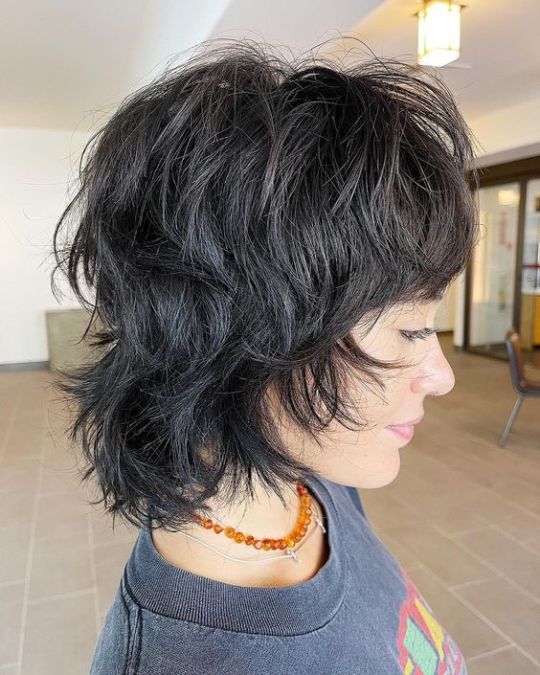
pictured: the besties being absolutely incapable of having common haircuts (theyve totally been chopping each other´s hair since the first time they got their hands on scissors and lack of adult supervision)
#oc: ally#oc: scarlet#sorry yall ally´s microbangs are back haha#also oughh i love them actually!!!#the idea of their vibes being completely different and constantly bantering#while genuinely being best friends with similar worldviews and love for mechanics >>>>>>>>#:))) my girlssss!!!!!#west coast#my ocs
1 note
·
View note
Text
SNK 137 Review
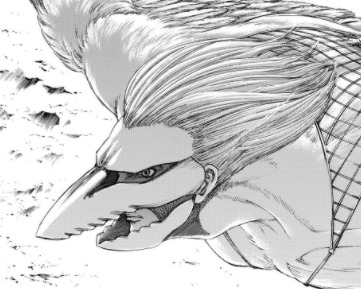
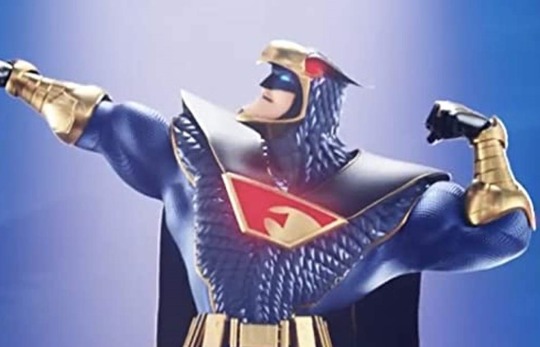
I can't unsee it.
-rubs temples-
Ok, I know I’ve been absent the past two chapters. I’ll get to why and what I thought of 135 and 136 in this post, but for now…jeez, this chapter.
It was badass and dumb and sometimes both at the same time.
Where do I even start?
-sound of pages being leafed through-
Ok, then.
I actually really like Zeke’s character. He is unironically my second favorite out of the cast.
When we first see Zeke, he’s in his beast titan form. He’s lumbering, hulking, unsettling.
He’s a titan that can talk. He’s a titan that can control other titans!
And he wiped out humanity’s second strongest with ease. I forget his name. It was Mickey, right?
Worst than that, actually. He ordered his titans to kill Mickey with all the gravitas of ordering a side of fries at McDonald’s.
Iirc fans were wondering if this new character would be the main villain of the series.
He went on to wipe out the Survey Corps at Shighanshina, and after that we learned he singlehandedly foiled his parent’s right-wing conspiracy when he was a kid.
Zeke was a mastermind who shouldn’t be taken lightly…right?
Welp, the more we saw of Zeke, the more obvious it became that he wasn’t actually all the impressive.
He wasn’t very good at being a warrior. Honestly, it seems most of his high marks comes from his unique royal blood powers, and the good will be built with Marley when he turned in his parents. TFW cronyism.
He foiled the restorationists plot, but really he was just an abused kid who wanted to get away from his parents.
He killed Mickey, but Zeke was a King Kong sized titan and Mickey was caught off guard and unarmed, so…yeah, ofc he won that fight.
Zeke has royal blood powers, but that doesn’t say anything about his intellectual prowess or anything.
The Survey Corps was wiped out at Shighanshina, but the circumstances of that fight strongly favored him. The Survey Corps were trapped in the city, so all Zeke had to do to win was sit on his ass and do nothing.
And he almost died anyway.
Levi got the drop on him because of his own incompetence. He let himself get distracted, which created the opening for Levi to strike.
Throw in his gullibleness towards Eren, his bumbling demeanor, and his totally emo philosophy, and the true nature of Zeke Jeager became undeniable: this guy is a fucking moron.
Like.
A real fucking moron.
And that’s why his character is unironically so great!
Zeke’s character is such a brilliant subversion of audience expectations.
We were all made to believe that this guy was a Big Fucking Deal through what turned out to mostly be circumstantial reasons.
In reality, he’s an idiot who’s been failing upwards his whole life.
Zeke got as far as he did because he’s really lucky. That’s all he has going for him.
I liked the more fleshed out version of his world view we got here. It is appropriately emo.
My read on Zeke has always been that if he existed in real life he’d be an extremely online philosophy bro, so seeing his outlook on life being effectively copy pasted from 4chan was just delightful.
Zeke is 2deep4(chan)u.
Life exists to multiply. All actions are explained by this singular drive. As such, life is hollow and we’re better off dead.
Imagine that is how you see the world.
Life sucks. It’s an existence of suffering driven by a desire to ensure more people are brought into this world so that they can toil away ensuring that yet more people are brought into this world to toil away ensuring people are brought into this world.
On and on and on and on.
To Zeke, this is the cycle of violence.
Not war which begets war which begets war, but rather life itself.
One suffering existence that begets another suffering existence that begets yet another suffering existence.
That is the context from which the euthanasia plan came from: it was an extension of this broader world view.
Everyone gets a dose of pain in this world, but Eldians especially get shafted. If anyone deserved release from this nihilistic existence that is “being alive,” it’s them.
Hence, Zeke’s plan to sterilize Eldians so they can die out peaceably.
…
It’s hilarious how easily Zeke is disabused of this notion.
I’m not sure if it works from a storytelling perspective, but it tracks perfectly with what usually happens when emo philosophy bros like Zeke have their beliefs challenged.
The emo bro will go on a self-absorbed rant about how nihilistic life is. For sake of example, let’s say the reason is because morality is just an opinion and nothing is objectively wrong.
The n the guy he’s ranting to will drop a critique on the bro so devastating that they’re left speechless:
“What about murder? Isn’t murder objectively wrong?”
Emo bro: -surprised pikachu face-
I swear to God this happens a lot. I don’t know if transplanting that into this pivotal storytelling moment works, but I sure as hell enjoyed it.
But, yeah, while we’re talking about philosophies, let’s look at some others.
Armin thinks there is beauty in pointless moments. Moments that are meaningful only for the people who partake in them. They’re an expression of the love they have for each other. Those moments are worth cherishing and protecting.
He’s right, but you know who also thinks that way?
Eren does.
Superficially, anyway.
When Eren starts rumbling the world, he thinks of his friends and the fun they’ve had together. He’s doing it for them.
Of course, he’s hurt them instead, but that’s still his logic, however deranged it may be.
What separates Armin from Eren is their sense of boundaries.
There are places that Eren is willing to push on towards that Armin is not.
For that, Eren thinks Armin is weak. All Eren had to say to him when they spoke at the restaurant was how useless Armin was.
Armin can’t go the distance. He can’t do what’s necessary. He takes options off the table too easily. He wanted to negotiate instead of seeing the truth that war was inevitable.
To Eren, that’s weakness.
In reality, it’s empathy.
Armin cares about people. Even people who hate him.
Eren doesn’t. If you’re his enemy, you’re dead to him, period.
Eren has no soul.
He may have slept under his enemy’s roof, ate his enemy’s food, and saw the good in them for himself, but he’s still killing them.
I don’t care if he’s crying on the inside. I don’t care how many times he said he’s sorry to Ramzi.
That actually makes it worse.
Eren made the calculation, the conscientious decision, that the lives of billions of people across multiple civilizations were worth less than that of his race.
Not even his whole race; just the subset of his race he was most familiar with!
Eren and Armin represent two widely similar, yet subtly different philosophies.
For Eren, the world is beautiful, but you have to do cruel things to protect that beauty.
The world is cruel because it is beautiful.
For Armin, the world is beautiful, but it is plagued by cruelty.
The world is cruel, but also beautiful.
SNK made the right choice. Armin was rightly depicted as the superior worldview.
(I have some gripes about how endemic the series seems to think cruelty is to the world, but we’re ignoring that now.)
Ymir is more of a wild card than I thought she’d be.
It seemed straightforward.
Ymir had been beaten and enslaved her whole life, so when Eren offered her freedom and treated her life a human, she sided with him.
That still looks to be what happened, but it seemed like Ymir also genuinely wanted to destroy the world with Eren.
The world treated her with cruelty, so of course she’d want to burn it all. Makes sense, right?
But Ymir, it turns out, is a lot more complicated than that.
She was beaten, enslaved, raped, hunted like an animal, and after all that, she still believed in this world.
She saw two lovers together, and that embodied what made the world worth getting attached to.
Those two lovers were her conquerors. Her oppressors.
She saw the love between two of her slavers, and instead of resentment or jealousy, she simply knew it was beautiful.
If people threaten his freedom, Eren wishes death upon them.
When Ymir is literally enslaved by them, she still acknowledges the beauty of their romance.
It’s a cool layer of complexity to add to their dynamic. They’ve been through similar shit, but they couldn’t be more dissimilar.
My guess is that Ymir is sympathetic to Armin and everyone came back to life through her help.
I know Armin Zeke the credit for that, but…that makes no sense?
Eren defeated Zeke when Ymir sided with him and he started the rumbling.
Eren, via Ymir, is in control, not Zeke, so it makes no sense for Zeke to be able to do any of this.
The only explanation is that Ymir broke from Eren and now Zeke is her new best friend.
…Yeah, this is the part where I talk about the bad stuff with this chapter.
The exact mechanics of how all of this went down is very underexplained.
Zeke being able to reveal himself like he did can be chalked up to Ymir’s power, but if it’s true this was purely Zeke’s doing, then…how?
How was Zee able to do that if Eren is in control? Why would Eren even put Zeke there instead of encasing him in crystal and keeping him physically close by?
This whole final battle has been very underwhelming for me, which is why I didn’t do a review for the last two chapters.
The premise is pretty bland.
The Alliance’s main opposition in this fight are mindless drones. The titans they’re fighting have no humans inside them, they’re just puppets. NPCs.
What drama there has been here has been the same fucking crap we’ve been dealing with for the past few volumes.
Yes, Mikasa, Eren has to die.
I know this is hard for her, but my patience has run out.
Eren told her to her face that they had to kill him if they wanted to win, and then when the Alliance is riding on Falco’s back, they make the final call to kill Eren and this is the face Mikasa makes.
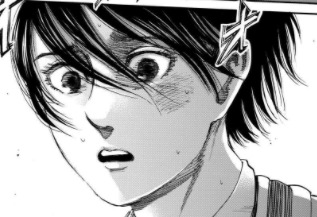
Like this is the first time she’s heard it.
This is the face you’d expect from a child, not a grown ass adult.
That was the moment I became convinced Mikasa would probably die in this fight.
Her head is too far up her ass as this point.
She is utterly incapable of processing the obvious fact that Eren hates her.
Yes, he’s theoretically destroying the world partly for her, but he’s also deranged and too self-absorbed to see that he’s hurt her. He has no real regard for her.
It is beyond annoying that there has been almost zero progression for her character on this issue.
If by this point in the story, she had accepted that Eren had to die, but was still visibly coping with that, then all would be well.
What’s frustrating is that just when it seems like we’ve progressed past that stage, we learn we haven’t.
I also feel that a lot of the major beats of the fight were pointless.
A major point in the battle comes when Armin gets eaten by the Okapi titan, and Mikasa, Annie, and the rest have to rescue him. But Armin didn’t seem to be in any danger of dying, and him being sent to P A T H S was actually a good thing in the end because he was able to win over Zeke.
The whole deal with the explosives around Eren’s neck was also pretty badly handled.
You’d think the hard part would be getting the explosives to the neck and securing them to it, but nope. Pieck took care of that in a couple of panels, and the real meat of the fight is doing the very last thing they need to do to win.
It’s very tedious and contrived.
Instead of a fight that’s interesting because they have to wrestle their way through titans while carrying the bombs, we get a totally generic fight because the story breezed through the hard part and all they have to do now is push a single button to win.
But in the end that entire sequence was pointless because Armin decides to blow everything up anyway.
Jean’s shining moment?
A total waste.
Reiner’s shining moment...wrangling that worm thing?
Also a total waste.
Armin was going to blow it up anyway. There is no way you can say that Eren would have survived Armin’s explosion but for Reiner and Jean’s efforts.
It just defies all common sense.
So yeah, this whole battle was a pretty lackluster climax.
Looking to the future, I think this is it.
There’s only two chapters left, so we need to start wrapping up. My guess is Eren’s likely dead and next chapter starts the epilogue.
Tally-ho.
---
I made a post about all the character’s chances of living or dying by the end of the manga. I figured I’d update those death ratings here.
Eren: Likely Alive --> Lean Dead
Historia: Likely Dead --> Toss Up
Mikasa and Reiner: Lean Dead --> Lean Alive
Annie: Lean Alive --> Likely Alive
Jean and Connie: Likely Dead --> Lean Alive
Pieck: Toss Up --> Lean Alive
Zeke: Lean Alive --> Ded
You’ll notice I’m still rating most of the cast as having a significant chance of dying.
While I do feel that this is probably the end of the battle, I’m choosing to be cautious in my choice of ratings.
Mayhaps Eren will pull a come from behind victory.
Ya never know.
21 notes
·
View notes
Text
Hero Killer: Stain / Blood Type Character Analysis
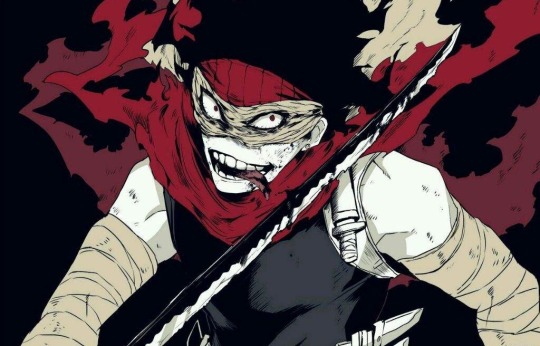
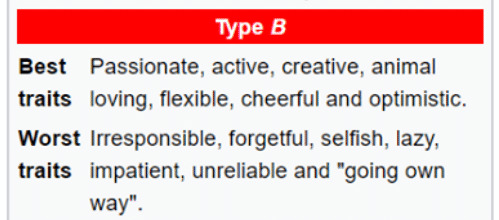
There are already plenty of video and written essays and analysis of Stain’s character, so I was wondering what else there was to put on the table. Then I thought: has anybody looked at Stain’s character through the lens of blood type personality theory?
Maybe someone has. But heck, I’m writing this anyway. This is happening. Hope people like it :) Comments/critiques/debates are all welcome :)
Below cut are SPOILERS for the Boku no Hero manga/anime and ESPECIALLY for the Illegals spin-off.
The Hero Killer’s fight with Deku, Todoroki and Iida demonstrated that his Quirk, Bloodcurdle is most effective against those with Type B blood - like the hero he attacked, Native - and the least effective against those with Type O blood, like Deku.
This fits Stain’s ideology perfectly: his Quirk is most effective against the kind of people he wants to purge from society (selfish and lazy heroes who do or don’t do their work for money or fame) and least effective against the kind of people he wants to see become true heroes (strong-willed, agreeable/kind individuals who save people selflessly like Deku).
The irony is that Stain himself also has type B blood. Whether this makes Stain a hypocrite, a self-hating or self-aware and introspective person is up for debate. Here I’m only going to analyse the specific traits that are attributed to Type B individuals and see how they reveal themselves in Stain.
Let’s start with the best.
Best traits
Passionate
Seriously? You wouldn’t have Stain if he didn’t have passion! Passion runs through him like a stick of rock. It encases his unflinching moral code and drives him every waking moment of the day. It’s what makes his charisma so powerful, even to complete strangers.
His passion remains a product of his steadfast will, morals and idealism. Before he walked the path of a vigilante and serial killer, Stain was more than likely a sincere, self-sacrificing and highly moral individual who would aspire to emulate the just and selfless heroics of All-Might. He must have exuded the same sincere passion when he made his soapbox speeches, only to be entirely ignored or rejected. Currently a not so insignificant portion of his passion is likely fueled by the despair he felt then.
You could argue that Stain is so devoted to the example set by heroes like All-Might, the ideal hero, that he is willing to destroy himself for the sake of the greater good. From the apparent dissociative attitude towards his alter-ego Stendhal in the Illegals spin-off, where Stain refuses to view himself and the blood-stained killer as the same person, and unyielding commitment to his reasons for killing as Stain - taking every opportunity given to him to justify his methods to others - Stain seems to be fighting a constant battle against himself.
The notion of killing the very people whom he had once idolised and wished to become, who he would most likely be far happier being right now, may account for his crazed tenacity and bloodlust. By convincing himself it is the only way to bring about change, Stain has trapped himself in a life of killing. The young man who onced dreamed of being a hero has become a murderer - no amount of conviction can wipe away the inherent despair, rage and self-destruction that entails.
Stain is not your typical maniacal villain, who derives happiness and satisfaction from killing. In fact, the only time he ever really smiles is when he is confronted by Deku in the alley, and perceives All-Might’s selfless heroism in him. Though the smile appears crazed, I believe it was genuine. Stain has dedicated at least twenty years of his life to bringing about a world where true, noble heroes like Deku exist. Seeing one in front of him, believing most others are nothing but fakes, must have elated him.
Not only does he see Deku as someone worthy of being kept alive, but Stain actively goes out of his way to save Deku when he could have easily escaped.
Active
If you dedicate your teenage years to making speeches in the name of reforming what you believe to be a corrupt society, crying out for a revival of heroics and return to a more just and selfless world, then dedicate your twenties and thirties to making that a reality through action, researching and disciplining his body and mind through self-study in order to achieve this... you are not lazy by any stretch of the imagination.
This man has been nothing but active for his entire thirty-one years of living, for better or worse. Since childhood he has always set himself a goal and done whatever he thought was best to achieve it. Even his enemies comments on his drive. It is unfortunate that this extreme drive and tenacity was poured into become a murderer, however.
Creative
This trait is evidenced by Stain’s fighting style. Though he is not as clever as Deku or powerful as other heroes, he is a thinker. He analyses Deku’s movements during their fight, comes up with a strategy to get close to Shota and paralyse him all in the space of a few seconds, and utilises his weapons in a multitude of different and inventive ways. His weapons are all specially utilised to facilitate and accentuate the effectiveness of his Quirk.
Even when severely injured and having only just come to after being knocked out, Stain is able to act to save Deku from the clutches of a Nomu when nobody else can even move. He thinks outside the box, using his Quirk resourcefully, albeit creepily, by licking the blood off a Pro Hero’s cheek in order to paralyse the Nomu before charging in for the kill.
His creativity in battle is lost, however, when he is pushed too far against the wall and he becomes more and more violent and erratic as the battle with Deku and co. drags on.
Animal-loving
As far as I know there is no canon evidence for this, but this adorable fanart by @ghostalebrije of Stain with a kitty friend gives me life. Maybe before his killing days Stain had a pet. Hell, maybe even as Stain he still had animal friends. He had to live somewhere in-between his hero-hunting, right?
Flexible
Physically, very. In battle we see that he gives it his all even in disadvantageous situations and combats multiple Quirks and battle styles, often at the same time. By analysing them as he fights, Stain proves himself a formidable opponent.
Personally, not so much. He is so driven and committed to his beliefs that anything outside the confines of his own moral code and ideals is rejected. For instance, he rejects Iida’s commitment to changing his ways, insisting that Iida will “always be a fake”.
This flaw in his methods/logic could be said to reveal a defensive mechanism that Stain employs to keep himself going. For example, if he were to admit that heroes he despises, like Iida, could change, then years of training and bloodshed and despair would have all been for nothing, in Stain’s eyes. If he admitted his methods were wrong, or that he could have gone about it all differently, Stain may not be able to psychologically deal with it.
This black-and-white view of heroism does not account for those who wish to attain hero status for selfish reasons, but those reasons involve benefiting the lives of others (e.g.: Ochako) and which will not interfere with their duty towards society.
Cheerful & Optimistic
In his younger days Stain was more like Deku, a starry-eyed kid dazzled and inspired by All-Might and dreaming of nothing else but following his example and helping others. If he had followed that path, Stain would have been happier for it.
The reality, unfortunately, is that Stain has become a bitter, rage-filled adult consumed by his ideology, hating the hypocrisy and vanity of pro heroes. He takes no joy in killing, though he perceives it as a necessary evil (he never smiles or laughs like maniac when killing or facing opponents). His conviction and killing intent were born from the despair and hopelessness he felt as his words and ideal view of a hero were ignored by society at large. He generally comes across as a very, very unhappy man who has all but killed himself for the sake of others.
Once he was a cheerful youngster, full of promise, but no longer.
As for optimism... it depends. When it comes to individuals, Stain is pessimistic. His black-and-white morals guarantee that those heroes he sees as immoral/fake will always be so.
On the other hand, Stain believes that an ideal world can be achieved, and that through heroes like Deku the corrupt hero system/community can be reformed, and that this will in turn benefit wider society. He does have confidence and hope in the future... but only he and people who share his ideals can act upon it. Stain’s optimism is, therefore, narrow.
Worst Traits
Irresponsible
If anything, Stain puts far more responsibility on his shoulders than any human being out to. While he may not be under the illusion that he alone can purge all the ‘fakes’ in hero society, he places himself as the one whose sole duty it is to make society see the ‘fakes’ the way he does and acknowledge his worldview.
He wants to be the giant red stain that makes society realise just how dirty it has become. It is a path to self-destruction that no human mind and body can take for long, and while his actions did have some short-term benefits (e.g.: lowering crime rates in the places he was active due to hero awareness) in the long-term they, however unintentionally, caused more misery and danger than before.
Forgetful
Stain literally forgets Deku’s recovery time as he becomes more and more stressed and pressed for time, costing him the battle.
It’s difficult to attribute this trait to him with solid evidence otherwise. You could say that Stain has become so obsessed with his goals and motivations for killing that he has forgotten who he used to be (someone very similar to Deku) and has lost a sense of perspective that could have helped him see alternative ways of promoting his ideals (like Deku does).
Selfish
Nobody asked Stain to take action on their behalf. Stain mutilated himself and stained his hands with blood, robbed himself of the chance of ever becoming a hero like All-Might (of which he had dreamed), committed himself to saving people from the darkness of alleys by killing heroes he sees as neglecting or outright abandoning their duties to the people.
I would argue, however, that Stain’s actions are selfless in the way Ayn Rand understood the word.
Rand writes, "[A]ltruism permits no concept of a self-respecting, self-supporting man—a man who supports his own life by his own effort and neither sacrifices himself nor others…it permits no concept of benevolent co-existence among men…it permits no concept of justice".
Stain has sacrificed his own body, mind and life on the altar of his ideals for the sake of a better society. Through his actions towards this goal, he eviscerates any opportunity of ‘benevolent co-existence among men’ and sacrifices others on a regular basis for the greater good.
This is directly opposed to Deku, who can in this way be seen as selfish. Both live by All-Might’s quote: “Meddling when you don’t need to is the essence of a hero”, but while Deku supports his life and that of others in order to achieve his dream of succeeding All-Might and helping people, Stain does it without any thought to himself or the individuals he deems sacrifices to his cause.
Stain never asks for alternative opinions and outright rejects any notion different from his (like Iida’s). In the Illegals spin-off, his final words after cutting off his nose show that he has entirely ceased to view or respect himself as an individual but instead as an ideology, calling himself “one without an existence who takes action” and a “colour which dyes the world”.
He is neither self-respecting or self-supporting (achieving his end goal appears to be the only thing he lives for and his bloody methods are “proof of his significance” - meaning he literally has no reason to exist unless ‘fake’ heroes give him that reason).
Stain has murdered his own sense of self for others. Personally that’s the most destructive example of altruism I can imagine.
Lazy
See ‘Active’ Best Trait. This man is only ever inactive when he is asleep.
Impatient
Stain is so desperate to revive the values and ideals of heroism that have been lost on the majority of heroes he has encountered that he is willing to kill to force society to pay attention. He has committed his life to be the “guiding bloodstain that cannot be wiped away”. He perceives killing (”purging”) fake heroes as the fastest route towards his end goal, abandoning his former, peaceful method of public speaking.
Unreliable
This is a tricky one, as so far I don’t think we’ve seen a moment where Stain was actually relied upon for anything. At a stretch you could say Tomura was relying on him to accept his invitation into the League of Villains, which Stain rejected.
Stain works alone, and neither society or any individual relied on him to push for change.
Deku has, however, come to understand the Hero Killer’s motivations and ideals, and has defended him from the force of wanton destruction and chaos that is Tomura. Deku knows that Stain abides by his strict moral code and strives towards his goals at detriment to himself (as seen when Stain saved Deku from the Noma). In this way, it could be argued that Deku in particular could rely upon Stain to adhere to this code and his ideals no matter what.
‘Going own way’
Stain’s passion has become so intense and obsessive that it has almost entirely lost his ability to think of any other way of being and acting, and at its worst is expressed through bloodlust and a killing intent Deku and his friends know too well.
He works alone, and though he was initially intrigued by Tomura’s offer he rejects it due to a complete conflict of motives and end goal. He believes he alone has the strength and commitment to make society see the problems he feels they are ignoring.
#{ Out of Fate }#{ OOF }#Boku no Hero#Boku no Hero Academia#My Hero Academia#analysis#essay#character analysis#Deku#Stain#Hero Killer Stain#Hero Killer: Stain#blood type personality theory#Shota Todoroki#Izuku Midoriya
0 notes
Text
Knight’s & Magic wants you to want to pilot a giant robot more than you want to pilot a giant robot.
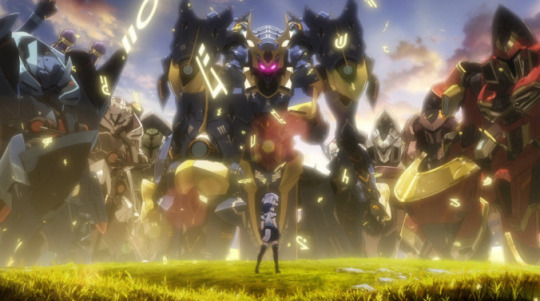
I’ve been enjoying Knight’s & Magic a lot this season. As someone who really only got into mecha fairly recently, something about the wide-eyed glee of the show’s protagonist, Ernesti, at being in a world of magic and robots really resonates with me. That enthusiasm? I get it! That’s where I’m at. But over the past few weeks, I’ve also had the opportunity to talk with a couple of good friends about the show, its nature as a wish fulfillment, self-insert fantasy, and some of the less charming elements that arise from that. While I may personally self insert as the characters who want to hug cute moeboys, these conversations have been a good opportunity to step back from my affections for the show and think more critically about it.
The source of some of the criticisms that have been leveled at Knight’s & Magic has primarily been its nature as an isekai and wish-fulfillment story. Throw a male character into another world where he gets the chance to be cool and awesome? Not an unfamiliar set-up in anime as of late, and certainly not one that some people have become tried of seeing. At this point, the isekai genre basically serves as its own notice for wish fulfillment stories. And although isekai certainly doesn’t have a monopoly here, these kinds of shows almost inherently lend themselves to wish fulfillment (something Frog-kun has dug into in his post on the Japanese response to the genre).
With that in mind, it’s understandable that Knight’s & Magic should find itself subject to critique by virtue of its use of the familiar movements of the genres in which it resides. Wish-fulfillment anime haven’t exactly made a good name for themselves, as shows like Sword Art Online and The Irregular at Magic High School (Mahouka) have become immensely popular because of their ability to butter up the viewer by fawning over their self-insert protagonists (often to the detriment of their moral quality). Meanwhile, on the isekai side of things, titles like No Game No Life, GATE, Konosuba, and Re:Zero have enjoyed a more complex fan response (although I certainly have my thoughts on the relative quality of each of them).
But this post is about Knight’s & Magic, which I think has, at least relative to the overall market, shown itself to be a far less troubling and thematically ugly production than many of its wish-fulfillment story compatriots. It’s not perfect by any means, but there are distinct elements within it that I think lend themselves to a kind of wish fulfillment that can be enjoyed without the moral compunction that accompanies similar shows. Specifically, where Knight’s & Magic differs and, I think, proves itself better than its peers, is in how transparently it communicates its nature as wish fulfillment and in how it uses some of its unique elements to undermine some of the typical tropes of its genre.
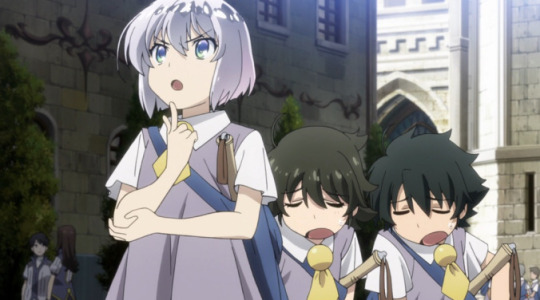
As I see it, there are two kinds of transparency in wish-fulfillment. The first, and most common, is the kind that accompanies marketing; that is, the audience knows the story is wish fulfillment because it’s obvious that this is the kind of story this is. The second, and the kind that I think is far more rare (and far more real), is the kind that a story demonstrates within itself. In other words, real transparency in wish-fulfillment is found only in those stories that acknowledge themselves as wish fulfillment.
Of course, I suppose one might argue that the first kind of transparency is just as real as the second. After all, if the audience knows an anime is going to allow them to self-insert for the purposes of wish-fulfillment because it’s been marketed that way, isn’t that the same thing? I don’t really think so. You might know No Game No Life is a designed to be wish fulfillment for a certain kind of purpose, but that’s not the same as the show itself knowing and acting like the thing it is. The salient point here is that a lot of these shows only pay lip service to the fact that they are wish fulfillment – which is, in my opinion, a rather insidious thing.
With shows like Mahouka or Sword Art Online, even though you know they’re wish fulfillment and they don’t really make any effort to hide that fact in their marketing or whatever, they often don’t treat themselves that way. Instead, a key component in the execution of fulfilling wishes is the pretense that wish fulfillment isn’t actually what’s happening. To use Mahouka as an example (and because I have a great deal for distaste for the show and it gives me pleasure to make it my whipping boy), the dead self-seriousness with which it presents itself belies the fundamental fantasy that underwrites it. Mahouka, even if it knows it’s wish fulfillment, pretends it is not.
Why is that bad? Because a wish fulfillment story that presents itself not as wish fulfillment absolves the audience of the need to self-reflect while watching it. It activates the self-insert mechanism without bothering to keep on the limiters of reality. I suppose, thinking about it one way, that’s not inherently a bad thing. After all, one of the great joys of fiction is the ability to be absorbed completely into another world. However, when that world is designed to construct a delusion of validation around you, it risks blurring the lines between fantasy and reality when the inevitable return to the latter occurs.

When the dissolution of those boundaries is coupled with ugly ideologies, gross attitudes towards women, and other sorts of nasty thematic underpinnings, it ends up reinforcing those ideas within the viewer’s worldview. That, to me, is an unambiguously bad thing. To use Mahouka as an example again, the message it communicates that “you’re awesome, and it’s actually society and others who are crappy because they aren’t capable of assessing your skills and you deserve to be lauded and constantly have beautiful women throwing themselves at you” is a pretty crappy one. The fact that it doesn’t even have the decency to recognize this itself (not that it would be that much better if it did), but instead treats this message as serious and legitimate… that’s bad.
But Knight’s & Magic doesn’t have these problems. It is a wish fulfillment story, yes, but it is also joyfully, cheerfully, and earnestly so. Down to the voice of the narrator grandly explaining Ernesti’s heroic deeds, the show is constantly reminding the audience of the artifice of it all. It is completely honest about what it is – and in a wish fulfillment story, that transparency is invaluable because it serves as a natural (and, in this specific case I would argue, rather gentle) buffer between the fantasy of fiction and the truth of reality. The ultra-quick pacing, the eager silliness of events, the heavy cliche, and the very genuine excitement of Ernesti himself all serve as constant reminders that the show knows exactly what it is and treats itself as such.
The ideology that Knight’s & Magic proclaims isn’t anything so self-insert affirming as “you are special, but unrecognized because society is unfair” or “the only reason you don’t shine is because you haven’t been given the chance” or even just “hey, all girls secretly are in love with you.” As Peter Fobian puts it, the fantasy of the show is one “where an enthusiastic character is given the opportunity to live out their passion.” The message in Knight’s & Magic is a simple one: Hey, you know what would be a lot of fun? If you were a super genius in a magical land with big robots?
And, you know what? It’s right. That would be fun! It’s the same sort of appeal that theorizing with friends about wild scenarios go, the “What if…? Okay, but what if…!?” thing we’ve all done. The world of Knight’s & Magic is a sandbox, and it makes sure you know that. As I see it, that’s an invitation to join in the fun, and since the show has largely steered away from having that fun come at the expense of others, playing along comes easy.
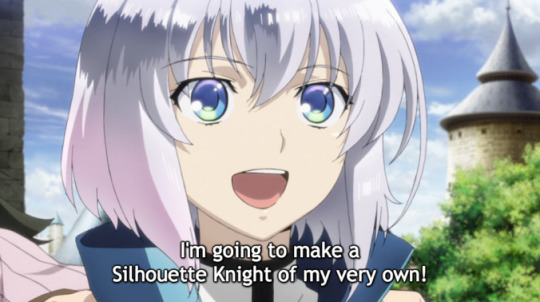
That’s not to say Knight’s & Magic is perfect. There are still elements mixed in with it that aren’t “fun” to me. I don’t like Helvi’s unnecessarily revealing clothing when the other (male) knights of her same rank get to wear actual uniforms. I was really uncomfortable with the way Ernesti seemed to justify taking Dietrich’s Silhouette Knight on the basis of Dietrich being a coward when he was clearly doing the best he could in an impossible situation. Playing around is all well and good, but things that treat other character badly cease to be fun.
And, alongside this, I can understand complaints about how the playground nature of the story glosses over human casualties to mack on its robots or how Ernesti’s combination of cuteness, cleverness, and purity of motivation earning him instant adoration from everyone trivializes the importance of hard work and forming genuine connections with others. One of the defining characteristics of wish fulfillment fantasies is often the erasure of nuance for the sake of making the self-insert feel good. And this oversimplification can mean the message communicated by a show turns rather sinister by ignoring important things.
But, again, this is where I feel Knight’s & Magic‘s transparency is a boon to it. Unlike Mahouka, which ignores nuance for the sake of pushing its message forward, or No Game No Life, in which a great deal of the “fun” is just really mean-spirited, Knight’s & Magic is a out for a harmless lark without pretense. And because of the innocence of its intentions, I find it difficult to fault the show for not being a serious examination of serious issues. It’s not trying to be a treatise on human relationships, so in some ways it feels unfair to criticize it for not being something it’s not trying to be.
To return to the show’s strengths, though, the final ingredient that makes this whole wish fulfillment thing go down well in Knight’s & Magic is the way it avoids glorifying Ernie as some kind of übermensch. Things like Ernie’s cuteness and the genuine nature of his relationships with other characters run counter to the way self-insert fantasies typically portray their protagonists as Awesome and Deserving Of Serious Respect. To use an example I’m particularly fond of, Ernie’s unwilling reception of Addy’s repeated hugs uses his appearance and reaction to make him the butt of a joke, (something Mahouka would never have done with Tatsuya, by the way). Likewise, goofy situations like in episode 3 where Ernie calls his desire to build a Silhouette Knight, a deadly serious matter for the world he’s in, a “hobby” in front of the king, make light of his one-track mind.

Although the overall narrative bends towards Ernie’s will, these kinds of moments go a long way towards not only towards making him less of an all-powerful figure for the audience to imagine themselves as, but also towards humanizing him. Ernie’s passion, eagerness, and authentic love for robots, whether or not they’re shared by the audience, paint a very specific and human portrait of a character. Sure, it’s touched up and made adorable with white hair that covers his eyes and hilariously effective within this world, but it’s also hard not to love this earnest caricature of someone who loves something the way Ernie loves robots.
In short, the only business Knight’s & Magic is concerned with is that of granting your wish to have fun, live in a bright, celebratory world, and to make and ride giant robots. And that, in my opinion, is a wish well worth fulfilling.
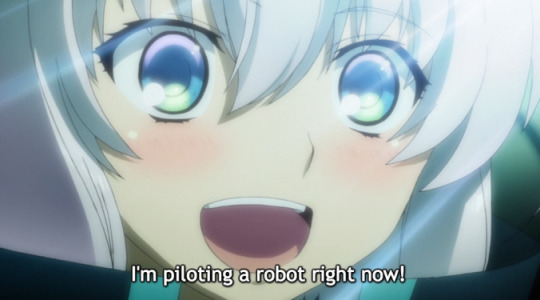
Knight's & Magic wants you to want to pilot a giant robot more than you want to pilot a giant robot. Knight's & Magic wants you to want to pilot a giant robot more than you want to pilot a giant robot.
0 notes